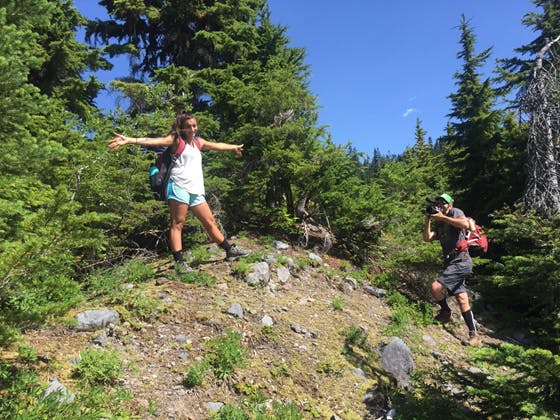The research visually displays the effects of climate change

Research conducted by Andy Bach, an environmental geography professor at Western, may have found a positive side effect to the melting of Mount Baker’s glaciers due to climate change.
Receding glaciers expose geological material that used to be under them, Bach said. The soil begins to develop on this exposed geological material.
“Part of soil development is an accumulation of organic matter, which is basically carbon that's being pulled out of the atmosphere,” Bach said. “Maybe there's this opportunity that some of the carbon will be pulled out of the atmosphere, to kind of mitigate the warming that's going on.”
Bach has been studying Mount Baker’s glaciers for about a decade, documenting the history of glacier recession and the soil development after glaciers recede. His research has recently gained attention from Western, Bach said.
“Recently they've been doing a great job of getting the word out,” Bach said. “Prior to that, no, in fact.
“I've been here at Western for 25 years, and two or three years ago, my dean of Huxley College said, ‘Well, who's doing climate change research?’ and I said, ‘Well, that's what I've been doing my whole career,’ and, like, they were shocked. They didn't even know I was doing it.”
Bach has been researching glaciers since 1990.
“I just find them fascinating,” Bach said. “They create beautiful landscapes.”
This research is important because it displays how quickly glaciers are melting, Bach said.
“There is a large proportion of the population that is of the belief that climate change is fake,” Bach said.
Presenting photos of glaciers receding may give people the visual evidence they need to believe that this is due to climate change, Bach said.
Third-year Western student Lizzie Chiou frequents Mount Baker and noticed the shrinking glaciers.
“They look really tiny; they look so small, like, they're receding so high up,” Chiou said. “I feel like they're going to be gone in maybe 10-20 years. I think they're just done.”
Director of the North Cascade Glacier Climate Project Mauri Pelto, who has studied glaciers for 40 years, said glacier research is not only important on the global scale, but locally as well.
“It's more critical on a local scale because that's where the watershed and water resources are,” Pelto said.
More universities should be researching their local areas, Pelto said.
“I think there’s a real lack of a focus on your own backyard,” Pelto said.
Universities that have well-funded research tend to do their studies internationally, Pelto said. The University of Washington, for example, does not do much research on glaciers in Washington, but focuses their efforts to research in Antarctica.
“Ohio State [University] does a lot of glacier research, but they don’t pay attention to the eutrophication of their lakes in Ohio due to climate change,” Pelto said
“It’s fine to do the international research, but you should have a local focus, and the local focus has been missing from the big research universities like [the University of Washington].”
Universities that conduct local research have an opportunity to keep their local communities informed and have a lower financial barrier to entry, Pelto said.
“They're the ones that can speak most clearly to the local audience,” Pelto said. “It's also cheap for them to get into the field, and it can work more easily with local organizations to really build the network.”
Chiou believes more climate change research is always good, but whether or not that research is used to slow down the effects of climate change matters most, she said.
“It will be a massive test of if everyone can pull together,” Chiou said.
Bach shared a similar sentiment, cautioning that blindness to the issue won’t make it go away.
“We as a society need to wake up,” Bach said.





